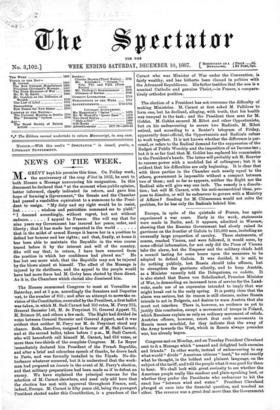The Houses summoned Congress to meet at Versailles on Saturday,
and at 2 p.m. accordingly the Senators and Deputies met, to the number of 852; and after an attempt to movethe re. vision of the Constitution, overruled by the President, a first ballot was taken, in which M. Sadi Carnet had 303 votes, M. Ferry 212, General Sanssier 148, M. de Freycinet 76, General Appert 72, M. Brisson 26, and others a few each. The Right had divided its votes between General Saussier and General Appert, and it was evident that neither M. Ferry nor M. de Freycinet stood any chance. Both, therefore, resigned in favour of M. Sadi Carnot; and at the second ballot, taken before 5 p.m., M. Sadi Carnot, who will henceforth call himself M. Carnet, had 616 votes, or more than two-thirds of the complete Congress. M. Le Royer immediately declared him President of the French Republic, and after a brief and colourless speech of thanks, he drove back to Paris, and was formally installed in the Elysde. No dis- turbance whatever occurred, but it is understood that the work- men had prepared an emeute in the event of M. Ferry's electi3n, and that military preparations had been made as if to defeat an enemy. We have explained the principal reasons for the selection of M. Carnet elsewhere, and need only add here that the election has met with approval throughout France, and, indeed, Europe. M. Carnot is fifty years old, being the youngest President elected under this Constitution, is a grandson of the Carnet who was Minister of War under the Convention, is fairly wealthy, and has hitherto been classed in politics with the Advanced Republicans. His father testifies that the son is a nominal Catholic and genuine Theist,—in France, a compara- tively orthodox position.






















































 Previous page
Previous page